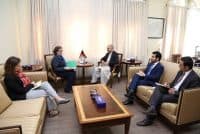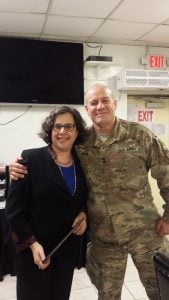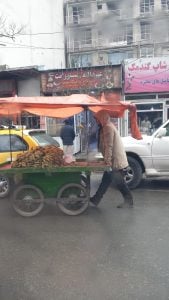Annie Pforzheimer
Oral Histories of U.S. Diplomacy in Afghanistan, 2001–2021
Interviewed by: Robin Matthewman
Interview date: October 12, 2022
Copyright 2022 ADST
Q: Good afternoon. It is October 12, 2022. I’m Robin Matthewman and I’m interviewing Annie Pforzheimer for ADST’s Afghanistan project.
Annie, you served twice in Afghanistan, first in 2009–2010 as political counselor, and then again, as the Deputy Chief of Mission in 2017–2018, for two different ambassadors at the beginning of the President Trump administration. And then, when you came back from post, you were acting deputy assistant secretary for five months, from September 2018 through March 2019. These positions were covered in your full oral history. Today, I would like to give you the chance to reflect on your thoughts on our overall presence in Afghanistan over the twenty year period, and what happened toward the end.

PFORZHEIMER: Thank you. As soon as I retired, I started writing, publicizing my critical views about U.S. policy and the direction it was heading, as far as both the policy of negotiating with the Taliban and then also the narrative within the United States. And the first thing I wrote was a piece in mid-2019 for the Foreign Service Journal called “Right Sizing Expectations in Afghanistan.” In that article, my point was that we had done a disservice, obviously, to the country of Afghanistan, but also to our own efforts, by consistently mislabeling what we were doing, what we hoped to achieve, and how long it would all take.
When I participated in the strategy review back in 2009, regarding the surge in troops, one of the points I made then is even more relevant today. The surge was part of the disaster of what happened in 2021 in the sense that, by inflating expectations of a military victory, it significantly shortened the American people’s attention span, or in particular their acceptance of the actual time that our engagement should have taken. I would have said instead: keep the expectations low; keep the troop numbers at a minimum: start to change the narrative away from the concept that the U.S. was at war at all [which by the time I served for the second time in Afghanistan, you could arguably say we were not] and put it more into the context of long term military engagements that the U.S. has in countries around the world where there is a strategic interest. And I kept that as my public line.

I personally tried to argue this in a couple of different ways. In 2019 and 2020, after retirement, I even participated in the presidential campaigns, starting with Pete Buttigieg, and then a little time with Elizabeth Warren, and then with Biden. As part of the campaigns’ foreign policy teams, I worked mainly on Latin America issues given my own background, but I used the opportunity in each of those campaigns to speak to people who were working on the Afghanistan issue. And I did get the same response in each case—which I thought was the wrong response—which was that the candidate would make public promises to withdraw troops.
So, in addition to that being, I thought, simply the wrong policy, it was also a really destructive policy at the time that Ambassador Khalilzad was negotiating. History is not going to be kind to Zalmay Khalilzad, but I do think there were times that he was trying hard to get the best deal possible in a U.S. political environment that was giving him almost no room to maneuver. And so not only was the then-president making a number of remarks, for example, at the end of December 2018, when I was still in the State Department, that he thought that we should pull all our troops out immediately. But all of the presidential candidates in the 2020 election were making the same statements, very publicly. None of this allowed Khalilzad any kind of negotiating room with the Taliban, since the only thing he had to trade was U.S. troop presence. So, these decisions were made in 2020. I still think that Khalilzad, in some respects, bought the Afghans more time than they might have otherwise had. In 2018, the president was pretty categorical in his desire to pull out troops and Khalilzad sort of did a bobbing and weaving maneuver to keep the negotiations going by promising that he would deliver some kind of peace agreement. And the president backed down from the withdrawal orders. I felt, I think, the only way you could feel and I have, I will say, probably lost friends along the way because of my strong feelings on this issue.
And when President Biden made his decision in April of 2021, I was heartbroken, I was disgusted, I was angry. The United States Institute for Peace study group had produced a report in February of 2021—by a dream team of former diplomats, military, academics, local experts—and they had counseled against a conditions-free withdrawal. And the Biden administration simply ignored it. They went with a decision that I think is one of the strategic and moral failures of my country’s history. So, I was part of various efforts, throughout 2020, to lobby against that decision, and in 2021, to warn of the consequences. And then since August of 2021, I’ve been part of different groups that are trying to help Afghans.
I’m still speaking out. And I’m doing a lot of different things. One of the things I tend to do is to try to use my own knowledge of the State Department, and how policymakers think to help outside advocates make their case more profoundly. This is not something I am paid to do. I have a lot of volunteer activities in this respect. And I’ve been on the board of directors for a nonprofit called Women for Afghan Women, which used to have U.S. government funding, and now does not. It had around a thousand people who were on staff or were clients who were in danger, and the U.S. government has helped none of them. The German government has helped some of them, the Canadian government has helped some of them, but the U.S. government has helped none of them.
Q: I’d like to ask you to explain this situation in more detail. So, these are women just because of their activism, and without ties to the United States that would give them Special Immigrant Visa [SIV] status, they—
PFORZHEIMER: They wouldn’t have been eligible for SIVs since they didn’t work directly for the military or embassy, but they were eligible for this refugee category of P-1 or P-2. P-2 in particular, which as far as I can tell is simply a cynical act by the U.S government to create activity for people who are desperately trying to help their workers get to safety in the United States. P-2s were supposed to be for people in exactly this category: a nonprofit that was receiving direct assistance from the U.S. government to carry out a democracy and human rights agenda, which in this case was protecting women from domestic violence. So Women for Afghan Women had lawyers, they had social workers, they had shelters. There were clients in those shelters. The U.S. government had been paying for the upkeep and the whole program. And from one day to the next, U.S. protection ceased, and these same women were on their own. The Afghan shelter leads and people in the organization had to basically get the women out, put them in people’s homes, repatriate them. We have settled some of them with their families, which was very risky.
Q: When you say repatriate, were these women able to get out of Afghanistan?
PFORZHEIMER: No, no, no, they were just able to get out of the shelters. They’re still in Afghanistan, or maybe they brought themselves to Pakistan. And as I said, in a few cases, the German government stepped in and miraculously took about a hundred people to Germany. But the Taliban, of course, not only considered people in women’s shelters to be prostitutes and the people who run those shelters to be criminals. The Taliban also released from jail all of the men who had been put there as abusers by these prosecuting attorneys. So, it was not only about the Taliban threatening our people, it was also their own former abusers. This is one organization I just happened to be on the board of. It is a microcosm of what we, the United States, did from one day to the next in terms of any kind of guarantee of safety. I mean, I’m not even talking about the economic disaster that we have precipitated. This is about safety. And we took it away. And there have been no efforts from the U.S. government to make it right. The only efforts to help are from individuals, private individuals.
Q: I interviewed Beth Jones last week and was listening to the efforts the State Department office, CARE [International] had been making on the people that they’ve been trying to get out.
PFORZHEIMER: Certainly. No offense to Beth Jones, but their organization doesn’t respond to the people I’m talking about. We’ve been told that in no uncertain terms that there is an order of business that the CARE team cares about [U.S. citizens, legal permanent residents, and SIVs are first priorities]. And the people that I’m describing are so far to the bottom, that they will never get seen.
Q: It’s heartbreaking in so many ways, isn’t it?
PFORZHEIMER: Yes. And it is unacceptable.
The CARE team is not designed bureaucratically to care about this group of people. They have told us that this is the purview of PRM [Bureau of Population, Refugees, and Migration]. PRM won’t basically answer people’s inquiries. I’m speaking now, from my efforts working with a group called Evacuate Our Allies, which is a coalition of dozens of veterans and refugees and nonprofits who have come together and who are trying to collectively get the U.S. government to face its responsibilities.
PRM is responsible for refugees. The P-1 and P-2 categories are refugee categories. But how do you help people? Well, the first thing they said was, they can’t help anybody who’s still in Afghanistan because we don’t have an embassy there. And let me just point out that when we’re talking about Ukraine, where we do have an embassy, they allow Ukrainians to do remote interviews, not Afghans. So, first of all, P-1 and P-2 interviews can’t be done if the person is in Afghanistan. If they got themselves out to another country, in theory, then they could get interviewed through PRM’s process with IOM [International Organization for Migration] and others to determine their eligibility for refugee status. It is taking a year so far, and counting, of people living in any legal status in another country for them to get the interview, which actually, as far as we know, isn’t happening at all.

Q: I want to go back to your call in 2020 and 2021 for keeping a small military stabilization force with lower U.S. expectations. One or two people have suggested that when the Biden administration came in, the U.S. would have had to increase the troop levels to maybe ten thousand or so in order to make that a stable situation. Does that conform with your understanding?
PFORZHEIMER: I think I’m not competent, necessarily on troop numbers, but it was down to say twenty-five hundred. Right, these numbers are incredibly fuzzy. There were twenty thousand contractors that people don’t count. I would go back to the USIP Study Group report. They said forty-five hundred U.S. troops. And when I talk about it, that’s what I say, because I have no reason to doubt the Study Group. And I also think that you match a troop number to the task. The task, in essence, was not to fight but to shore up the Afghan national security forces. There was every indication that NATO [North Atlantic Treaty Organization] would have contributed more troops. So it’s not a zero-sum. What was the United States going to do all by itself? If more troops were needed, and the U.S. didn’t want to put them there, another country would have done so.
Q: So many people didn’t seem to understand the shoring-up role of the U.S. troops and contractors. The thought was that, They have a military. We’ve armed them. We’ve trained them to fight. But they couldn’t be successful without this shoring up. It wasn’t necessarily true that the Afghan soldiers just didn’t want to fight,
PFORZHEIMER: No, not at all.
Q: You make an important point about how we should have looked at our true objective for all those years. Are there any other topics that you’d like to make sure we highlight?
PFORZHEIMER: No, I said much of what I wanted to say. There’s a legitimate narrative that we didn’t know what we wanted. And I think that’s fair. There were crafted national strategies on Afghanistan, but they changed. And, politically speaking, or due to some other aspect of human nature, somehow it seemed impossible for one group to accept another group’s strategy. And because things always seemed dire on the ground, it was always assumed to be dire exactly because the previous strategy was terrible. So, it was a pendulum of try this, no, try it’s opposite. This changeability was really hard for Afghans to get a grip on. So, the first thing I would say is that our ability to maintain a strategic coherence, ironically, is either within the four years of a single president––or over fifty years, like with the Cold War.
But we’re very changeable. And we’re changeable in proportion to the amount of attention that’s paid to the issue at hand. If everyone’s staring at it, then the urge to tinker grows greater.
And I always thought, my sort of simplistic version of a way around that tendency is to make it dull. Make this all sort of boring, just like stationing troops in Aviano, Italy, which no one pays attention to. Don’t talk about it. Don’t glorify it. Don’t use the word “war.” You know, Americans adopt a “wars take four years” mode and that’s it. But don’t do that. Talk about it like this long, tough slog that’s going to benefit us, because we would have had an ally in Central Asia, bordering Iran and China and Pakistan, that we could have depended on forever. An airbase in the middle of this strategic part of the continent. Things that really mattered, things that we should have been pointing to. Don’t talk about it like it’s a war that has a beginning, middle and armistice, that is ridiculous.
And then the demonization of the Afghans is so appalling. I mean, they are not demons. They are not angels. They are just survivors. Normal people and smart, normal people in many, many cases. And I hate to see how Afghans are spoken of. And people I knew in the Afghan civil service, who were pretty run of the mill, were not stealing money, and had actual big hopes about their own country, may have made it to the U.S. but don’t want to be here.
Q: And so basically, you are emphasizing there was a transformation in the country during the twenty years?
PFORZHEIMER: Yeah, I mean, there were many transformations. But it’s not fair to say that the transformations were to the people. These are the same people. Right? But they had different tools at their disposal. And so, we didn’t transform or change the people. But we did offer up the space and time to create institutions that had slightly more subtlety to them as far as ruling. And had more long-term integration with the rest of the world economy or the rest of the world’s media, that kind of thing. So, we offered them integration, we offered them institutions, we offered them space and time. And we should have taken, I would say ten to twenty years more, and done an incredibly gradual tapering off where you’re just holding your finger and then you let it go. Right. That would have led to the stability that I think should have been our clear goal from the start.

Q: And just to draw it out a little bit on the institution building. There were incredible advances over time in health and education, and even in rule of law, right?
PFORZHEIMER: Yeah. Well, the one I point to is the civil service exams, that began to be administered on a yearly basis, where people were taking the same exam all around the country. And if you were some not-well-connected, not-Pashtun person taking an exam, and you got a job in the government, that was a revolutionary act. And it was starting to happen with qualified teachers and qualified bureaucrats. This was this quiet revolution that nobody could take even five minutes to learn about. The education and health advances are very real, but they’re also the kind of thing that maybe somebody gives somebody else. Whereas the civil service exam took hundreds and thousands of hours of Afghan people figuring out what to put on it, how to administer it, how to score it, who to give a job to. And this is the painstaking work of a society that can be seen as representative and fair. And again, stable.
Q: Right. And it all fell apart. And it’s not going to be recreated for a long time.
PFORZHEIMER: Right. Well, the question of, what happens now? I’m engaging with people who are trying to explore that. I’m working on a paper about that and working with CSIS [Center for Strategic and International Studies]. I’ll be doing another panel later this month. There’s nothing to do except to try to figure out routes and support. I don’t spend that much time on the evacuation issue. I’m trying to figure out what kind of policies can be pushed that will help the people who are still there.
Q: And including engagement with the Taliban government?
PFORZHEIMER: No, I don’t think that’s a good policy. Engagement. I strongly disagree that we should be engaging with them more than absolutely necessary. And I don’t think we should be doing it at a senior level. Which we’re sort of not. But I was in favor and advocated very strongly for renewing the travel ban and ending the exemptions, which did happen at the UN [United Nations] two months ago.
Q: All right. Well, Annie, I want to say thank you so much for your time. And unless there’s anything else that you want to touch on, I think we’ll go ahead and end here.
PFORZHEIMER: Okay, thank you.
